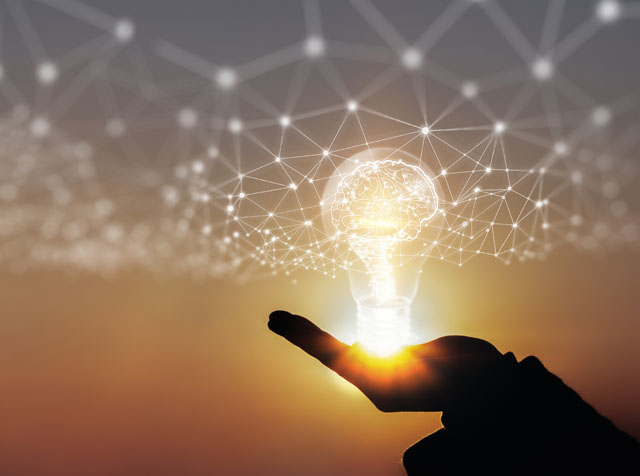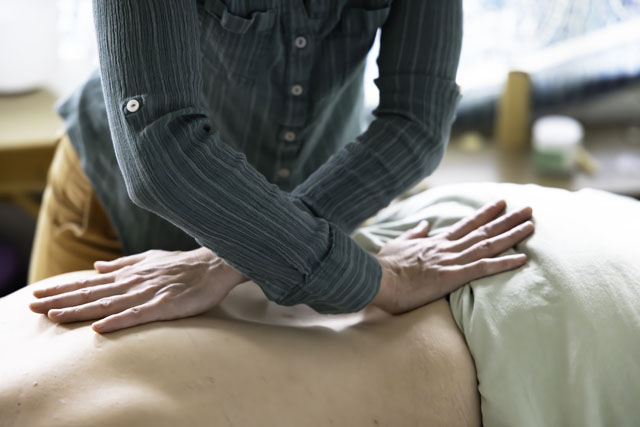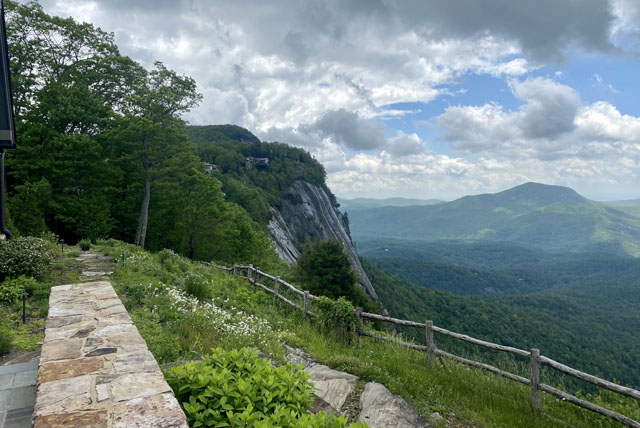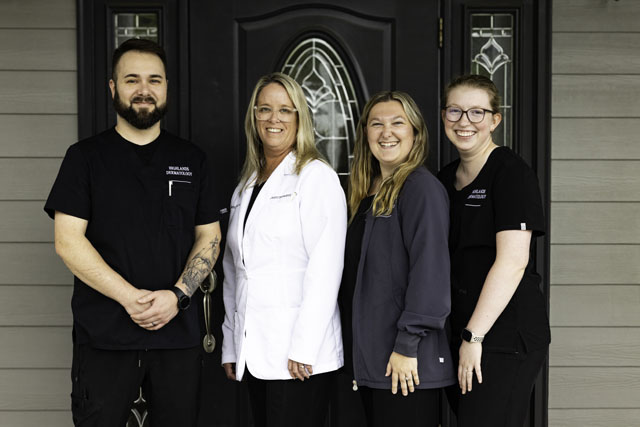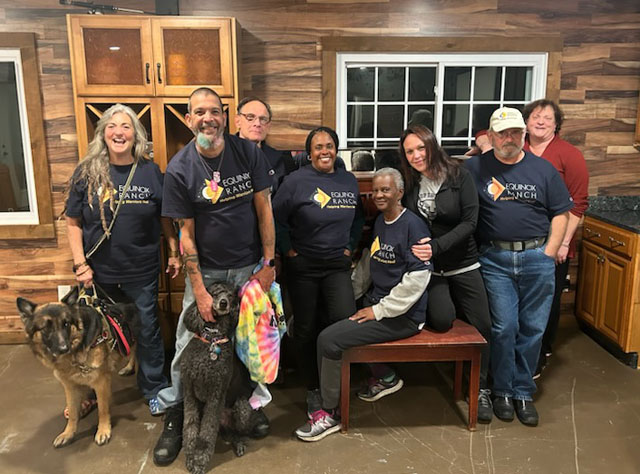Cultivating Inner Health and Wellness
02 Aug 2023
Acupuncturist Audrey Powell knows the importance of balance
By MARIANNE LEEK
Photos by CAROLE SHEPARDSON
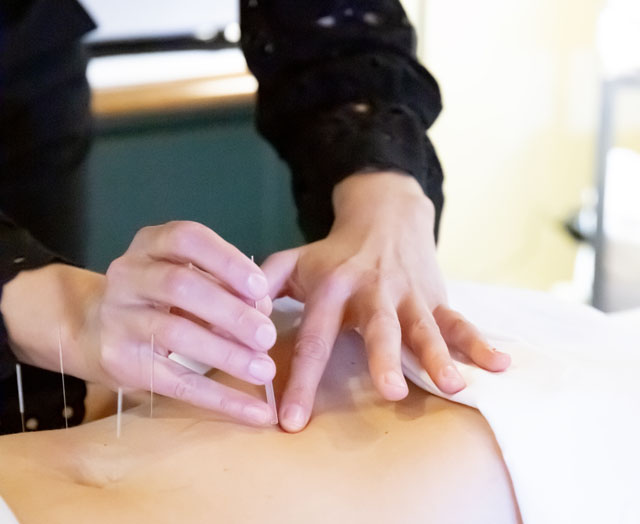
Dr. Audrey Powell is a National Board Certified and licensed Acupuncturist and the owner of Inner Gardener Acupuncture in Highlands and Franklin, North Carolina. She has a Master of Science in Traditional Chinese Medicine and a Doctorate in Medical Acupuncture Research. Powell is not only highly qualified and skilled in acupuncture but also in herbal medicine and manual therapy, such as therapeutic massage and cupping.
Powell was inspired to consider alternative treatments when she was a young adult suffering from chronic illness and malaise. “I first found herbalism as a young woman experiencing an autoimmune condition that resulted in years of chronic fatigue, fibromyalgia, chronic ear, nose and throat infections, a thyroid tumor, and a very sensitive immune system. The only things available from my doctor were antibiotics and antidepressants. From a young age, I just knew this was not the right solution for my body. I remember being in the aisle at a natural grocer, flipping through books on herbal medicine, and that was kind of it. Herbs became my go-to for just about everything, so I enrolled in some western herbal courses at a local college, and that was over twelve years ago.”
But alternative treatments should not be viewed as a quick fix, and Powell is adamant that all treatments are more effective in combination with preventive measures that do not have to be expensive or complicated. “Prevention medicine is largely about what we consume, and I will always convey first that food is medicine or poison. Eliminating processed sugars, drinking clean, filtered water, eating dense fibrous greens and legumes, caring about your produce and meat sources, adding different supplements and herbs to fill the gaps, and supporting the body with acupuncture, bodywork, chiropractic, yoga, meditation, qi gong, etc. It's never just one thing. All the little things add up and are significant. Taking evening walks, eating a colorful variety of fruits and vegetables, resistance training, stretching, dancing, hiking… it's all the things.” Our overall health and well-being are intricately interconnected, a combination of what we eat, our lifestyle and habits, and our environment. The aggregate of these directly affects our mental, emotional and physical health.
Having made it her life’s work to help people heal themselves, Powell wants her patients to view symptoms as an opportunity to self-reflect and begin to make healthy changes. She is particularly passionate about the role that acupuncture can play in health and healing, especially when it comes to digestive issues. She explained, “I love working with digestive health. There is so much healing to be done in the gut. I believe very firmly that gut health is the foundation of whole-body health and wellness. We know from the emergence of psychoneuroimmunology research that gut microbiota is directly related to mental health, cognition, energy, clarity, emotional regulation, and immune function. This is major, especially in our world today. So many people feel chronically fatigued and bloated, anxious and depressed, have brain fog, and are constantly dealing with bouts of illness. I love helping people make the connection of gut/brain significance and helping them with acupuncture and lifestyle adjustments such as having more food label awareness (reading labels, looking at sugar/sodium content), choosing better ingredients, and preparing more dense and nutritious meals at home.”
Acupuncture is traditional Chinese medicine that can be used to prevent or effectively treat a myriad of symptoms related to digestive, neurological, mental, musculoskeletal and women’s health issues. Acupuncture, which has been practiced for over 2,500 years, involves inserting very thin, solid needles at certain “acupoints” on the body to stimulate self-healing. It is widely used to alleviate chronic pain as well as symptoms of ailments like depression, insomnia, morning sickness and allergies. To many, it is considered a miracle treatment that can exponentially improve one’s quality of life.
Asked to explain the science of acupuncture in layman's terms, Powell responded, “Acupuncture is nervous system medicine. A major function of the nervous system is to control or maintain homeostasis. Homeostasis is perfect balance. When our bodies fall out of homeostasis, symptoms arise, and these symptoms are an invitation for us to observe where we have fallen out of alignment. Acupuncture enhances communication through the central nervous system, which has a direct relationship with cells, nerves, organs, glands, and tissues. This then plays a significant role in the production of hormones, neurotransmitters, circulation, digestion, sleep, blood pressure, etc. Much like a stone cast into a lake, acupuncture creates a ripple effect of therapeutic benefit. It is very effective at balancing the parasympathetic/sympathetic nervous system so that everything else can self-correct/self-heal.”
Powell wants those considering acupuncture to realize that “acupuncture is not a spontaneous healing or a one-and-done treatment. Many people do have an incredible reduction of symptoms from just one treatment, but I do my best to inform people that acupuncture works as a series of treatments, and everybody responds differently. Each treatment builds durability much like getting into a new fitness routine, learning a new instrument, going to see a counselor or therapist, etc. It's about creating a new pattern, getting your body into a new routine where the scales are a bit more balanced so the body can then self-correct.” She added, “Chronic diseases are years in the making, and reversing these complex symptoms can take months or years to resolve, depending on lifestyle, frequency of treatments, and overall effort of the individual.”
And for those with “needle phobia,” she offered some reassurance, “Acupuncture does not involve the use of hypodermic needles. Acupuncture needles are solid, stainless steel, and extremely thin like a strand of hair. Most people feel anxious the first time because of the anticipation of the needle, but I have a very gentle approach and always check in with my patients to see how they are feeling. It's nothing like getting a blood draw or a tattoo, and most people are shocked that they barely noticed the needle at all.”
Powell is optimistic about the future of medicine, “We are expanding our understanding of how health and healing works, bridging the gap between ancient and modern medicine. Healing is not linear, but rather an intricate web that can require both difficult and simple changes. I love helping guide others back into their body. We all have high expectations of our bodies. We want it to keep us moving forward with vigor, strength, and health, but we can't just expect this beautiful inner ecosystem to thrive if we have not attended to its warning signs and symptoms. Symptoms are an invitation to examine what is out of balance, and this examination requires curiosity and a guide, like that of an acupuncturist, naturopath, or physician. It requires a close, honest examination of our lives, what’s on our fork, our environment, our social atmosphere, relationships, family, etc.
“From the lens of interconnection, health is related to everything. It’s why I named my practice Inner Gardener Acupuncture. Anyone who has ever gardened or worked land knows that each season requires careful consideration of soil health and nurturing its environment for optimal growth and resilience against disease. You can’t leave a garden unattended for too long. If you do, your plants will dry up and wilt; the root will rot if the drainage pathways are clogged; harmful microorganisms can spoil the fruit, and so on. Healing doesn’t happen from just one pathway.”


